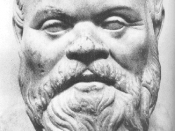The late Albert Camus was not the only man to write about the absurd. Many other existentialist philosophers such as Søren Kierkegaard and Friedrich Nietzsche have their own views on what the absurd is, and more importantly how to deal with it. But what is the absurd anyway?
According to Camus, the absurd is realizing the fact that we will not be able to find the meaning of life which we seek. No matter what we accomplish, eventually we will die and ultimately our ventures are meaningless. We can come to the conclusion that life is either meaningless, or we can take a leap of faith, in the hope that God exists and live our lives accordingly. If we look a little closer at the first option, that life is meaningless, does that mean that life is then not worth living? If this were true, we would have no choice but to take a leap of faith or commit suicide!
Camus opens his famous work, Le Mythe de Sisyphe (The Myth of Sisyphus) by boldly claiming that suicide is the only truly serious philosophical problem.
He also rejects the ultimatum of either suicide or a leap of faith and chooses to pursue a third possibility; that we can accept this meaninglessness of life and live life without purpose and enjoy it. In, fact, according to Camus, it is only with realizing this third option that we can live life to the fullest.
Camus outlines three distinguishing features of the absurd life wherein the only certainty is there is no certainty: revolt, freedom, and passion. Revolt is Camus' idea that we must always strive for concord and order but realize that this order is impossible putting us in a perpetual state of conflict. Freedom is used not in the traditional sense...


